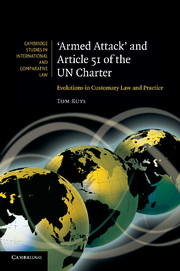Book contents
- Frontmatter
- Contents
- Acknowledgment
- Table of abbreviations and abbreviated citations
- Selected case law, legislation and related documents
- Introduction
- 1 The methodological debate and the quest for custom
- 2 ‘Armed attack’ and other conditions of self-defence
- 3 The ‘armed attack’ requirement ratione materiae
- 4 The ‘armed attack’ requirement ratione temporis
- 5 The ‘armed attack’ requirement ratione personae
- 6 What future for the ‘armed attack’ criterion?
- Index
- References
Introduction
Published online by Cambridge University Press: 10 January 2011
- Frontmatter
- Contents
- Acknowledgment
- Table of abbreviations and abbreviated citations
- Selected case law, legislation and related documents
- Introduction
- 1 The methodological debate and the quest for custom
- 2 ‘Armed attack’ and other conditions of self-defence
- 3 The ‘armed attack’ requirement ratione materiae
- 4 The ‘armed attack’ requirement ratione temporis
- 5 The ‘armed attack’ requirement ratione personae
- 6 What future for the ‘armed attack’ criterion?
- Index
- References
Summary
On 27 June 1986, the International Court of Justice pronounced its much-anticipated judgment in the Nicaragua case. For the first time in its history, it gave a direct and elaborate ruling on issues pertaining to the international law on the use of force (Ius ad Bellum), including on the conditions for the exercise of States' right of self-defence. If the Court's approach merits praise for unequivocally affirming that disputes involving the recourse to force are inherently justiciable, it is somewhat puzzling what led the Hague Judges to conclude that ‘[t]here appears now to be general agreement on the nature of the acts which can be treated as constituting armed attacks’, triggering the right of self-defence. Whether it was naïvety, over-confidence or bluff on their part is open to speculation, yet one need not possess the combined legal skills of Grotius and Vattel to understand that it did not completely reflect normative reality.
Indeed, ever since the creation of the United Nations in 1945, scholars have been deeply divided over the purport of Article 51 UN Charter, which enshrines the right of self-defence ‘if an armed attack occurs’. Opinions differ as to whether the latter phrase extends to ‘protection of nationals’ abroad; whether it sanctions defensive measures against small-scale attacks or ‘imminent’ attacks; whether it permits military action against States engaged in so-called ‘indirect aggression’, et cetera.
- Type
- Chapter
- Information
- 'Armed Attack' and Article 51 of the UN CharterEvolutions in Customary Law and Practice, pp. 1 - 5Publisher: Cambridge University PressPrint publication year: 2010
References
- 1
- Cited by



